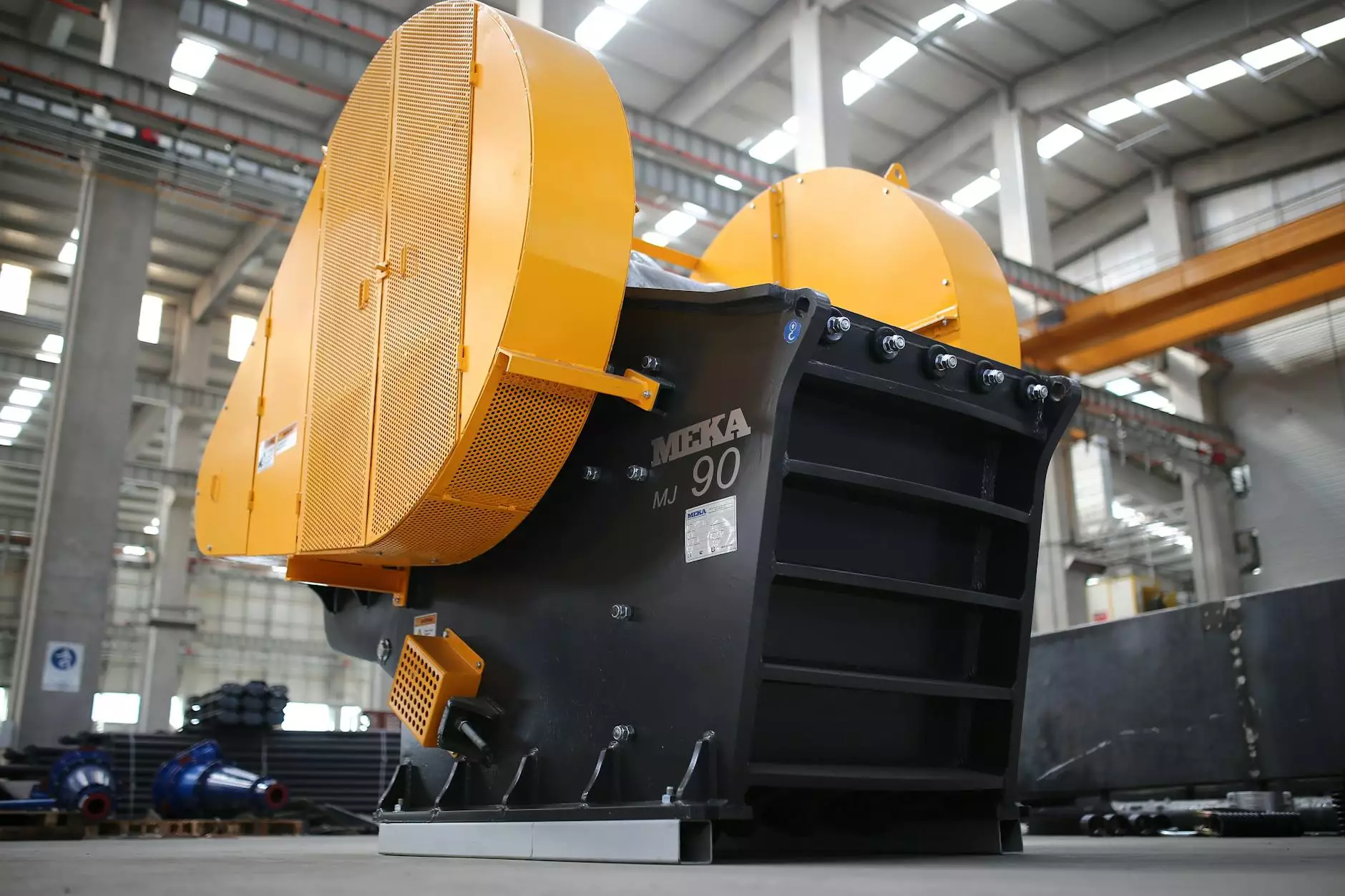The Ultimate Guide to Stationary Crushing Plants

Introduction
The construction and mining industries have witnessed significant advancements, particularly in equipment and technology. One aspect that has significantly evolved is the stationary crushing plant. These plants play a critical role in producing aggregates for various construction projects, ensuring high efficiency and durability in the materials produced.
What is a Stationary Crushing Plant?
A stationary crushing plant refers to a fixed location setup where bulk materials are processed. This comprehensive facility comprises multiple stages of crushing, screening, and sometimes washing, to produce high-quality aggregate materials necessary for construction applications. Unlike mobile units, stationary plants are established at a specific site, allowing them to perform high-capacity production over extended periods.
Key Components of a Stationary Crushing Plant
Understanding the components of a stationary crushing plant is crucial for grasping its operations. Each component plays a vital role in the efficiency and effectiveness of the crushing process.
1. Jaw Crushers
The jaw crusher is often the first stage in the crushing process. It is designed to handle large feed sizes and reduce them to manageable aggregates. Key features of jaw crushers include:
- Durability: Manufactured with robust materials to withstand heavy loads.
- High Reduction Ratio: Capable of reducing raw feed sizes significantly.
- Simple Operation: Easy to operate with minimal training required.
2. Cone Crushers
Following the jaw crusher, cone crushers provide a secondary crushing stage, further refining the product size. Benefits of cone crushers include:
- Versatility: Suitable for various materials, including hard and abrasive rocks.
- Efficiency: Optimized for high throughput and lower wear rates.
- Improved Product Quality: Provides superior shape and quality of crushed material.
3. Screening Equipment
Screening equipment is crucial for sorting and sizing the crushed materials appropriately. This equipment helps in:
- Separation: Differentiating between various sizes of crushed material.
- Quality Control: Ensuring only the highest-quality aggregates are produced.
- Efficiency: Maximizing the output quality of the stationary plant.
4. Conveyors
Conveyor systems play a pivotal role in transporting materials between different crushing stages. Their advantages include:
- Continuous Operation: Allowing for an uninterrupted flow of materials.
- Reduced Labor: Minimizing the need for manual transportation of aggregates.
- Space Efficiency: Utilizing vertical and horizontal space effectively.
Advantages of Using a Stationary Crushing Plant
The choice of a stationary crushing plant over mobile alternatives offers numerous advantages, making it the preferred option for many contractors and construction firms:
1. Higher Production Capacity
Stationary plants are capable of processing large volumes of material swiftly, which translates to enhanced productivity. The reason being, they can accommodate multiple stages of crushing and screening simultaneously.
2. Cost-Effectiveness
Over time, stationary plants may prove more cost-effective as they require less frequent maintenance and offer lower operational costs due to their steadiness and stability. The higher initial investment is offset by the long-term savings in labor, fuel, and maintenance.
3. Durability and Reliability
Built for extensive usage, stationary crushing plants are generally constructed with high-quality materials designed to endure rigorous conditions and heavy workloads without compromising performance.
4. Enhanced Safety Features
Stationary plants are designed with numerous safety features in mind, which minimizes on-site accidents and protects operators. In contrast to mobile units, which can pose various hazards due to their mobility, stationary plants offer a more controlled environment.
Applications of Stationary Crushing Plants
The versatility of stationary crushing plants allows for a wide range of applications, including:
1. Construction Industry
From road construction to building projects, aggregates sourced from stationary plants are fundamental to creating strong and durable structures.
2. Mining and Quarrying
Stationary plants extract valuable minerals and ores, providing essential materials for various industrial applications.
3. Recycling Efforts
These plants also play a crucial role in recycling processes, enabling the extraction of aggregate materials from construction and demolition waste, promoting sustainability.
Choosing the Right Stationary Crushing Plant
When selecting a stationary crushing plant, several factors must be considered to ensure that the facility meets your specific needs:
1. Material Characteristics
Understand the type of materials you will be processing, as different materials may require different equipment settings and configurations.
2. Required Production Volume
The expected output should dictate the size and capabilities of the plant. Analyze market demands to project future needs accurately.
3. Plant Design and Configuration
Consider a layout that optimizes material flow and minimizes handling. Tailor the plant design according to available space and production processes.
4. Maintenance and Support Services
Look for manufacturers that offer comprehensive maintenance and support services. This ensures your plant remains operational with minimal downtime.
Leading Suppliers of Stationary Crushing Plants
In the industry, several companies are recognized for their high-quality stationary crushing plants. Polygonmach stands out as a leader in the field, delivering innovative solutions to meet various construction and mining requirements.
1. Polygonmach
Polygonmach specializes in designing and manufacturing a range of stationary crushing plants tailored to individual client needs, emphasizing reliability and performance.
2. Metso Outotec
Known for their advanced automation and integration capabilities, Metso Outotec provides stationary equipment that maximizes production efficiency and minimizes environmental impact.
3. Terex
Terex offers a broad spectrum of crushing and screening solutions, known for their robust designs and innovative technologies, contributing significantly to the efficiency of stationary plants.
Conclusion
In conclusion, the importance of a stationary crushing plant in modern construction and mining cannot be overstated. As industries continue evolving, optimizing these facilities will be paramount for productivity, quality, and sustainability. Understanding their components, operations, and benefits can help businesses make informed decisions that boost efficiency and profitability.
Future Perspectives
The future of stationary crushing plants is bright, with ongoing advances in technology poised to revolutionize how materials are processed. Innovations such as automation, remote monitoring, and artificial intelligence integration will further enhance the operational capabilities of these plants, ensuring they remain at the forefront of industrial productivity.
Whether you are looking to invest in a stationary crushing plant or upgrade your existing setup, making a knowledgeable choice can lead to long-term success and substantial gains in your projects.







